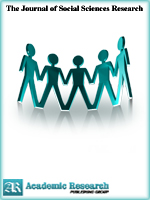The Journal of Social Sciences Research
Online ISSN: 2411-9458
Print ISSN: 2413-6670
Print ISSN: 2413-6670
Quarterly Published (4 Issues Per Year)

Archives
Volume 2 Number 9 September 2016
Understanding Machiavelli over Absolute Monrachy and Republic
Authors: Atil Cem Cicek ; Gokboru Onalp
Pages: 167-172
Abstract
Machiavelli generally grounds his discourses on the government, regime, the ways that empower the government and the policy to be followed in determining the state power and limits and on the elements that lead to the decay or collapse of the state. According to Machiavelli, all the regimes somehow come to an end. What is important is to create a good regime construction and to turn this into a long-lasting structure. Machiavelli, generally mentioned by absolute monarchy, actually supported the absolute monarchy in a certain period especially during the establishment of the state. In his work called Discourses on Livy, he mentioned the supporting of the republican regime during the development stage of the state. Moreover, he emphasized that republican regime is essential for the continuity and longevity of the state. In this study the answers given by Machiavelli, regarded as the founder of modern state theory, to the issue about how a good and long-lasting regime can be established are attempted to be discussed based on the author’s point of view regarding absolute monarchy and republican regimes. At this point, it is worth discussing the approach of Machiavelli to Republic, whose discourses were associated with and evaluated as absolute monarchy and even tyranny. Of course, while this discussion is made, based on the principle of period thinking, Italy and even Europe at the time when the philosopher lived should also be considered. Especially including Italy in the evaluation, which had not yet provided its central union and was governed by small principalities has a vital importance in terms of accurately identifying the opinions of Machiavelli. While the research is made, descriptive and historical research methods have been used.
Effects of Self-Management Technique on Test Anxiety among Secondary School Students
Authors: Ada Anyamene ; Chinyelu Nwokolo ; Ifeanyi Azuji
Pages: 159-166
Abstract
Test anxiety is an observable fact that many students usually encounter during tests. It is considered to be one of the most common and widespread emotions, with a large number of the student population suffering from its excessive and overbearing level. This study investigated the Effect of Self-management Technique in reducing Test Anxiety among secondary school students. Two research questions were posed and two hypotheses formulated to guide the study. The study is a quasi-experimental research and employed a 2x2 factorial design pretest-posttest experimental control group, comprising two groups (Experimental group and control) using one treatment group (Self-management Technique {SMT . The population comprised all the secondary school students in Onitsha urban areas with test anxiety. A total of 77 students were selected from two schools using a standardised instrument titled “Test Anxiety Inventory”. The instrument, Test Anxiety Inventory was administered to both the experimental group and the control group before and after treatments, making up the pre test and post test. The data relating to the research questions were analysed using mean scores. The data relating to the null hypotheses were analysed using the Analysis of Co-variance (ANCOVA). The result of the study showed that self-management technique was effective and significant in reducing test anxiety. Based on the findings of the study, the implications of the findings were highlighted, recommendations and suggestions for further studies made. The researcher recommended, among others that Self-management technique should be utilised by guidance counsellors in reducing test anxiety among secondary school students in the State and the nation in general.



